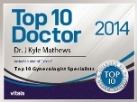Natural Remedies that Alleviate Incontinence in Women
While not life threatening, urinary incontinence can cause embarrassment and frustration. Dr. J.K. Mathews specializes in correcting pelvic disorders, both stress incontinence and urge incontinence, which lead to the accidental release of urine.
Board certified in urogynecology positions Dr. Mathews to effectively treat incontinence with today’s advanced techniques. He may recommend a minimally invasive surgical technique, or suggest non invasive treatments to address your incontinence.
Many times, though, simple changes symptoms of incontinence can be alleviated.
The course of treatment begins with a conversation about your health history. Dr. Mathews will review your Bladder Diary, a useful tool for tracking voiding patterns. He will also offer suggestions for lifestyle and dietary changes to help you avoid gynecological surgery.
Controlling Incontinence Starts with Identifying the Cause
The passing of time, childbirth, a chronic cough or frequent bladder infections can place stress on your bladder.
- If you have stress incontinence, you’ll notice leaking when you cough, sneeze, laugh, lift or jump. Weak or damaged sphincter or pelvic muscles as a result of childbirth, surgery, injury or certain medications cause stress incontinence.
- If you have urge incontinence, making it to the bathroom in time becomes a problem. Urge incontinence, or overactive bladder, is caused by nerve damage, disease or injury.
You may have a combination of urge and stress incontinence and other issues such as prolapse contributing to the problem. Dr. Mathews will know for certain after a physical examination and testing.
Make Dietary Changes for Bladder Health
Caffeine and alcohol are diuretics, and can lead to bladder control problems. Consider reducing or eliminating coffee, tea and sodas and note whether your incontinence pattern changes.
Drinking less fluid each day can also help. Of course, avoid dehydration by consuming at least (8) 8-ounce glasses of water each day.
Constipation can also lead to incontinence, so eat a fiber-rich diet and avoid these bladder irritants: spicy foods, citrus fruits and carbonated beverages.
You do not have to live with incontinence. Dr. Mathews sees patients in Plano, Frisco and Dallas who opted to restore their quality of life. Contact our Plano urogyn office for a consultation with Dr. Mathews.
Perform Kegel Exercises
Dr. Mathews recommends Kegel exercises to strengthen pelvic floor muscles. Women with mild symptoms benefit from a daily routine of contracting then relaxing the muscles within your pelvis, as though you are trying to internally grip a tampon.
Void Your Bladder on Schedule
If urinary urgency is a problem you may benefit from visiting the bathroom before you feel the urge to urinate. Your voiding diary will be helpful in determining how long it takes you to fill your bladder before you experience urgency. Allowing adequate time for you to fully empty your bladder will help prevent what Dr. Mathews calls double voiding. This means that after you urinate, stand up and sit down to try again. You may also lean forward to compress the abdomen.
Maintain a Healthy Weight
Excess weight can exacerbate urinary incontinence by putting pressure on the bladder and stress on muscles.
Quit Smoking
Add incontinence to the list of reasons to quit smoking. Nicotine irritates the bladder, and coughing, a side effect from smoking cigarettes, leads to stress incontinence.
You do not have to live with incontinence. Dr. Mathews sees patients in Plano, Frisco and Dallas who opted to restore their quality of life. Contact our Plano urogyn office for a consultation with Dr. Mathews.











